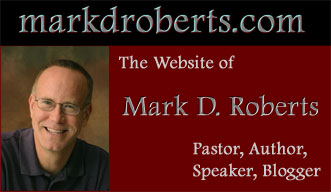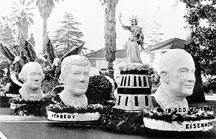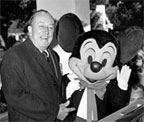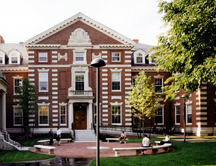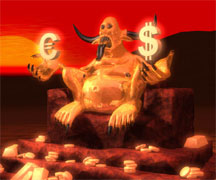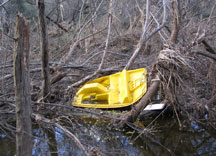| |
A Resource by Mark D. Roberts |
|
Archive for January 2005
Note: This archive contains all of my posts for this month that are not included in some other series. I really don't have the time to save things in more than one place. If you're looking for a specific item, use the "Search" button in the upper left hand corner. Thanks. |
by Rev. Dr. Mark D. Roberts
Copyright © 2005 by Mark D. Roberts
Note: You may download this resource at no cost, for personal use or for use in a Christian ministry, as long as you are not publishing it for sale. All I ask is that you give credit where credit is due. For all other uses, please contact me at mark@markdroberts.com . Thank you.
Rose Parade Memories
Posted at 11:30 a.m. on January 1, 2005!!!
Like millions of Americans, I watched the Rose Parade this morning. And, like millions of Americans, I watched the parade on television (from the comfort of my sister’s living room, which, ironically, is in Pasadena, California, about a mile from the parade). I enjoy the parade, no matter how I see it. But I enjoy even more the memories of watching the Rose Parade as a child.
| I grew up in Glendale, California, one town over from Pasadena. My family had a tradition of viewing the Rose Parade in person. We’d wake up at about 5:00 a.m. on New Year’s morning and drive to Pasadena, parking about two miles from the parade route. Then we’d assemble our caravan, which included wagons, strollers, and lots of pedestrians. Our goal was to get to the parade route early enough to find good seats along the side of the road. Then my dad and grandfather would set up an elaborate scaffold with ladders and planks. (These are no longer legal, I’m sad to say.) Finally, after what seemed like an eternity of waiting, the parade would begin. For the next two hours I’d enjoy a steady stream of floats, bands, and equestrian units. (Frankly, I could have done without the horses.) |
|
| |
|
Among my favorite memories are these:
• Drinking hot chocolate while perched up on a wooden plank, six feet above the ground.
• Seeing Walt Disney in person when he was the parade’s Grand Marshall.
• Riding on my dad’s shoulders on the way back from the parade. I must have been fairly young, but I have a clear memory of grabbing onto his head while we made the long trek from the parade back to our car. |
|
| |
Walt Disney as Grand Marshall with his pal Mickey, who was the Grand Marshall this year. |
When I entered my teenage years, parade attendance lost its luster. Besides, we got a color TV and it was a whole lot easier to watch the parade from the comfort of our family room. (Trivia factoid: the first national color telecast was the 1954 Rose Parade, which was shown on 21 stations throughout the country.) But one year I did get to work on the floats. I spent a whole day in a refrigerated pavilion gluing flowers onto a float. By the end of the day my hands were covered with sticky glue. I was tired and sore, but happy. The highlight of the day was seeing actor Michael Landon about five feet away as he as touring the pavilion.
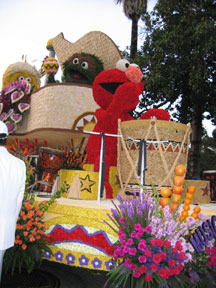 |
In the early 80s I enjoyed the Rose Parade while lounging in the lap of luxury. My wife, a marriage and family therapist, worked on the third floor of an office building on Colorado Blvd. in Pasadena, right in the center of the parade. So we’d get up at a reasonable hour, drive to reserved parking lot 50 yards from the parade, and watch the whole extravaganza from a warm, comfortable office suite filled with friends and food. When we got tired of peering out the windows, we’d sit comfortably on sofas until some especially stunning float came by. It wasn’t quite the as much of an adventure as my boyhood experiences, but it was cushy.
In the last few years I’ve gone to the parade with my family a number of times. This year I was just too tired to make the effort, but my children got up before dawn to see the floats before it began. My sister and her family were gracious enough to let my kids tag along with them. But, as I was cozy in my warm bed this morning, I must confess that a part of me wished I were out in the crisp morning air examining those amazing, flower-colored floats. Nevertheless, I did catch a good chunk of the parade on television, so now I can start the new year. |
A close up of one of today's floats, courtesy of my son the photographer. |
|
Home
A Common Life
Posted at 10:00 p.m. on Sunday, January 9, 2005
The first part of a sermon called "A Common Life."
A Most Embarrassing Moment
| As I think back upon my life, at times I cringe with embarrassment over things I have said and done. I remember, for example, a time in the first month of my freshman year of college. I had attended a meeting of the Harvard-Radcliffe Christian Fellowship, where I met an older student named Anne. In the course of our conversation, she suggested that we have lunch sometime. This wasn't a pick up line, mind you, just an exercise in Christian charity. But when we met in the Freshman Union for lunch, I wanted to impress her nevertheless, so I was riding high on my intellectual horse . . . you know, big words, big ideas, lots of arrogance thrown in for good measure. (Women love this sort of thing!) |
|
| |
A picture of the building that was the Freshman Union in 1975. Now it's the Barker Center for the Humanities. |
Anyway, when Anne asked me how I described myself ideologically, I said proudly, "I'm a Christian and a communist." Yes, I really said that. (Sigh!) Then I went on to explain, oh so cleverly, how the early Christian community in Acts 2 shared their goods together and this was a form of communism. Anne, who was a very sharp and intuitive woman, (she graduated Phi Beta Kappa in Psychology) was also quite sensitive. She graciously received my explanation and only gently suggested that just maybe there was a difference between the voluntary sharing of possessions among Christians, such as we see in Acts 2, and communism, in which the state owns everything. My attempt to defend myself to Anne was pathetic, and it was the last time, truly, that I ever called myself a communist. Today, as I think back upon that conversation, I cringe. In my feeble attempt to look brilliant and provocative I simply played the fool.
Today I have the chance to make things amends, to erase the foolishness I once professed, because today we're looking at the very text I brandished that day in the Freshman Union. (And, thanks to the Internet, I actually found out what became of Anne. She's an accomplished author and psychotherapist. If this sermon's any good, I just might send it to her as a gesture of repentance.)
Two Points from a Straightforward Text
I want to be clear from the outset that Anne was right about Acts 2. This passage is not a treatise on political government. Rather it is describing how the early church functioned in its internal relationships. To derive communism from this passage, which, by the way, was once common among liberal Christian interpreters, is to miss entirely the context and point of the text. It tells us how we should relate to each other as brothers in sisters in Christ, not how we ought to live as citizens of a socialist secular state.
Acts 2:44 tells us that the earliest Christians "were together" and "had all things in common." We should spend a few moments unpacking these two phrases.
The Greek expression translated as "were together" means, quite literally, to be in the same physical location with someone else. Luke's point is that the first Christians were not merely united in theology or in spirit, but in physical proximity. To put it in today's language, they "hung out" together. They had plenty of "face time."
Given the fact that we're talking here about more than 3,000 people, Acts 2:44 refers not so much to a giant gathering of believers as to what we would call small groups. You can see this clearly if you hop down to verse 46, where it says, "Day by day, as they spent much time together in the temple, they broke bread at home . . . ." In other words, they gathered in each other's homes to share meals together, a particularly intimate form of fellowship in the world of first-century Judaism.
The phrase "had all things in common" means more or less that the early Christians "had all things in common." To put it a little differently, they shared their stuff together. Apparently they came to think differently about their personal possessions after they believed Jesus to be the Messiah. The whole concept of "my stuff" faded away, replaced by a new sense of "our stuff." It's rather like the classic Spanish expression of hospitality, "Mi casa es su casa," "My house is your house." The early believers, freely, not in response any requirement laid upon them by the state or by the apostles, came to see their possessions as something to be shared with others. To continue reading this sermon, click here.
How to Find Freedom from the Monster of Mammon
Posted at 10:30 p.m. on Saturday, January 22, 2005
The first part of a sermon you can find here.
Two weeks ago TIME magazine cover proclaimed: “The Science of Happiness.” The edition featured a 68-page special report on happiness. I was glad to see that religion figured prominently, and even quite positively, in the report. In fact, you’ll be glad to know that scientific studies have consistently shown that religious people are happier than non-religious. And, what’s more, if you incorporate your faith into your daily life, you’ll be even happier than nominally religious folk. And, if you’re planning on going to church this weekend, you’re making a wise move. According to TIME, and I quote: “Attending services has a particularly strong correlation to feeling happy” (A46). So how does that make you feel? |
|
| |
Now that's a Mammon monster!
|
I don’t want to focus on religion and happiness right now, but rather on the connection between money and happiness, or between the stuff money can buy and happiness. TIME magazine had lots to say about this, including one whole article called “The Real Truth About Money” (A32-34). I want to quote several passages from this article, written by Gregg Easterbrook, a senior editor of the New Republic. (If you’re intrigued, you can read Easterbrook’s article or, better yet, his startling book The Progress Paradox).
If you made a graph of American life since the end of World War II, every line concerning money and the things that money can buy would soar upward, a statistical monument to materialism. Inflation-adjusted income per American has almost tripled. The size of the typical new house has more than doubled. A two-car garage was once a goal; now we're nearly a three-car nation. Designer everything, personal electronics and other items that didn't even exist a half-century ago are now affordable. No matter how you chart the trends in earning and spending, everything is up, up, up. But if you made a chart of American happiness since the end of World War II, the lines would be as flat as a marble tabletop.
Millions of us spend more time and energy pursuing the things money can buy than engaging in activities that create real fulfillment in life, like cultivating friendships, helping others and developing a spiritual sense.
We say we know that money can't buy happiness. In the TIME poll, when people were asked about their major source of happiness, money ranked 14th. Still, we behave as though happiness is one wave of a credit card away. Too many Americans view expensive purchases as "shortcuts to well-being," says Martin Seligman, a psychologist at the University of Pennsylvania. But people are poor predictors of where those shortcuts will take them.
The surprise is that after a person's annual income exceeds $10,000 or so, . . . money and happiness decouple and cease to have much to do with each other.
Paradoxically, it is the very increase in money--which creates the wealth so visible in today's society--that triggers dissatisfaction. As material expectations keep rising, more money may engender only more desires. "What people want in terms of material things and life experiences has increased almost exactly in lockstep with the postwar earnings curve," [research psychologist Edward] Diener notes. As men and women move up the economic ladder, most almost immediately stop feeling grateful for their elevated circumstances and focus on what they still don't have.
That money never satisfies is suggested by this telling fact: polls show that Americans believe that, whatever their income level, they need more to live well. Even those making large sums said still larger sums were required. We seem conditioned to think we do not have enough, even if objectively our lives are comfortable.
Fixated on always getting more, we fail to appreciate how much we have. Psychology and sociology aside, there is a final reason money can't buy happiness: the things that really matter in life are not sold in stores. Love, friendship, family, respect, a place in the community, the belief that your life has purpose--those are the essentials of human fulfillment, and they cannot be purchased with cash. Everyone needs a certain amount of money, but chasing money rather than meaning is a formula for discontent. Too many Americans have made materialism and the cycle of work and spend their principal goals. Then they wonder why they don't feel happy.
I don’t know about you, but this sure makes me think. Part of what impresses me is the source of this wisdom. You can’t exactly write it off as other-worldly drivel from some out-of-touch preacher. This appears in a review of psychological research in a secular news magazine. The conclusion is not especially new, of course. For decades we’ve heard that money doesn’t buy happiness. And yet there’s a part of us that still believes that it does, or at least we live our lives that way.
Have you bought into the lie? Do you live under the power of gold? Do you need to break free from the iron grip of materialism?
If not, you’re an unusual human being. After all, we live in a world dominated by consumption. This is true of the United States in general, and of California more specifically, and of Orange County even more. In this world we are, first and foremost, consumers. In this world we’re told in thousands of ways that real happiness is to be found in things: in custom homes, elegant cars, designer clothing, and electronic gadgets. In this world identity isn’t a matter of food, but finance; it’s no longer “you are what you eat” but “you are what you buy.”
Jesus said we can’t serve God and wealth (or mammon, the Aramaic word for money). But we who are prisoners of our consumerist culture try hard to prove him wrong. We seek to serve God and Mammon too.
How are you going to know if you’re trying to do what Jesus said is impossible? How are you going to see if you’re living right now behind materialistic bars? I want to ask you some personal questions that might help you determine whether you’re living in freedom or bondage when it comes to Mammon:
• Have you ever bought something you really didn’t need because you thought it would make you happy?
• Have you ever spent money on something you didn’t need because you felt sad or depressed or bored?
• Have you ever spent money you didn’t really need to spend because you wanted to keep up appearances?
• Have you ever taken on unnecessary debt because you bought some “extra” for which you just weren’t willing to wait?
• Have you ever envied someone else for what he or she possesses, even feeling resentment because you weren’t able to possess that thing yourself?
• Do you own expensive things that you rarely use or rarely enjoy?
• Do you find your desires for things exceeding your needs, not to mention your budget, and do you sometimes fulfill those desires even though you know you shouldn’t?
• Do you sometimes work extra hours to make money you really don’t need, sacrificing your primary relationships in the process?
• Do you find yourself speaking in terms of material “needs” which, if you’re honest, aren’t true needs at all?
• Does your spending on yourself ever cause you to be less generous with others?
I’ll stop now, graciously. I expect most of you have said “yes” to at least one of these questions. Here’s my honest confession: I said “yes” to most of them. I’m not accusing you of something I don’t struggle with myself. The vast majority of us are, at least to some extent, under the power of Mammon.
So what will help us to break free? What will allow us to get off the work and spend treadmill so that we might experience greater happiness in life, not to mention greater meaning and purpose?
For the answer to this question, click here to continue reading the sermon.
Reasons to Smile
Posted at 11:00 p.m. on Friday, January 28, 2005
| If you're new to my blog, I should explain that I often do heavier blogging during the week, with lighter fare on the weekend. I'll get back to my "Rolling Stone" series soon. |
| In the category of "Strange but true" I was hiking along Malibu Creek last week when I saw a strange sight. There, in the midst of a brush-filled canyon, I saw a pedal boat: stranded, caught in some trees, at least two miles from the nearest lake. All I can figure is that somebody left this out when the record-breaking rains of early January hit Southern California, and the peddle boat was swept along the creek until it got caught in the trees. Today the creek couldn't carry a toy boat for more than a few yards before the boat would get stopped by boulders. |
|
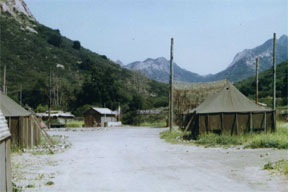 |
|
One of the most interesting features of Malibu Creek State Park is the location of the M*A*S*H set from the beloved television show. There's not much left of the set today, just a couple of rusted out jeeps. But, as you can see from comparing the two pictures, the place looks just like the television show. I heard the theme music in my head as a wandered about the old set.
To hear a clip of the M*A*S*H theme music, click here. (Note: this is an MP3 version. If you need a WAV file, click here; or a MOV version, click here.)
Tonight I accompanied my daughter to her Girl Scout Dad-Daughter Sock Hop. We had lots of fun together. Before the dance we had dinner at a 50's theme diner (see below). |
Above: the M*A*S*H set as it looked years ago.
Below: the way it looked last week. |
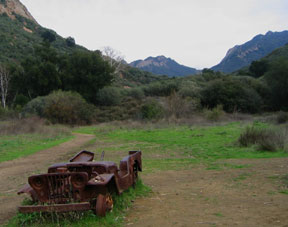 |
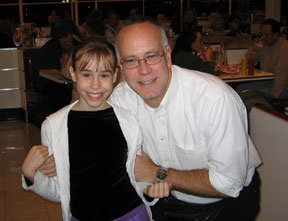 |
The dance was fun, given the fact that I dance just about as well as I speak Russian (can anybody say "borscht"?) But my lack of ability didn't stop my daughter. In the photo on the left she's doing the "Swim," along with her friends, who are the twin daughters of my associate pastor Tim. You can see Tim in the background on the left, in the white T-shirt, rocking out, with his hand outstretched.
During the sock hop there was a limbo competition, which I graciously avoided. No child under 18 should be forced to see me attempt to limbo. |
|
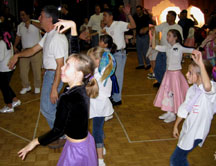 |
| Yet friends of mine had the courage to join in. Below is a picture of Tim, doing the limbo in a mode of unabashed praise. Click here for a short video clip. |
|
The winner of the limbo contest turned out to be a man from my church (see below). For a short clip of someone who can really do the limbo, click here. |
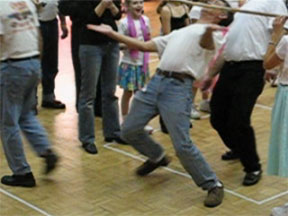 |
|
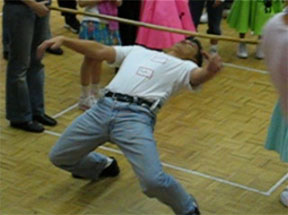 |
Well, I hope I've given you some reasons to smile.
Congratulations are in Order
Posted at 9:45 p.m. on Saturday, January 29, 2005
Congratulations are in order, first for my friend, fellow pastor-blogger, and now honored author, Dr. Tod Bolsinger. Tod’s first (!) book, It Takes a Church to Raise a Christian, has been selected as a finalist for the Christianity Today Book Awards in the Church/Pastoral category. Way to go, Tod!
Simply to be selected as a finalist is an honor, especially for a first-time author. It would be a similar to an actor getting an Oscar nomination for his first major film. Even if Tod doesn’t win, being a finalist is a true feather in his cap.
Now for the “I told you so” boast. Shortly after Tod’s book came out, I wrote a review for Amazon. Here’s what I said:
There are many books on the church. Some of them have theological substance, but they're hopelessly hard to read -- for experts only. Others are readable, but so "lite" and "practical" that you wonder if the author has done much theological or biblical reflection on the subject matter.
Once in a great while a book comes along that combines genuine theological substance with engaging readability. This is the book!
Bolsinger has done his theological homework. (This book is a popularized version of his Ph.D. dissertation.) He will help you to see the church in relationship to the Trinity. But he is also an engaging writer, whose turns of phrase are memorable and whose illustrations are insightful.
|
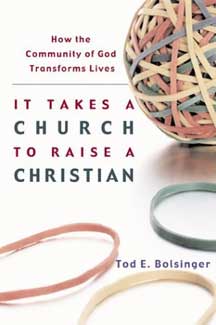 |
| |
Or to make a rubber band ball! |
|
If you're looking for a "seven superficial secrets to make your church grow" kind of book, look elsewhere. But if you're seeking a biblically-based, theologically-solid book that is also readable and engaging, then buy this book. Right now would be a good idea!
So, if anyone thought I said these things about the book because Tod is my friend, now you know I wasn’t just being nice. It Takes a Church is a fine book, well worth reading.
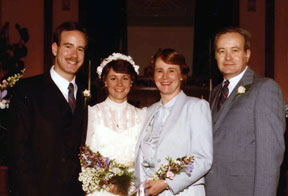 |
Congratulations are also in order for my mother, who is celebrating her fiftieth wedding anniversary on Sunday. I’m sad to say that my father won’t be celebrating with her, because he went to be with the Lord eighteen years ago after a long struggle with colon and liver cancer. So it is a bittersweet day for our family.
I’m quite sure that, if my dad were still alive, he and my mother would have made it to the big five-zero. Their love was strong, as was their enjoyment of life together. They exemplified faithfulness and commitment, both to each other and to God. |
I don't have any pictures of my parents' wedding on hand, but I do have this picture of my parents at our wedding, twenty years ago. |
|
So, Mom, I only wish Dad were here to celebrate with us. You were a great couple together!
|
